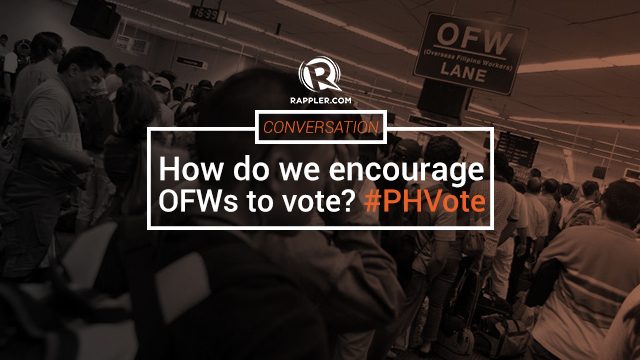SUMMARY
This is AI generated summarization, which may have errors. For context, always refer to the full article.

MANILA, Philippines – Although the Commission on Elections (Comelec) has improved the voters’ registration process and its information campaign, the percentage of overseas Filipinos registering to vote or those casting their vote abroad, continues to be low. (READ: How do we encourage OFWs to vote?)
The turnout for OFW voters continues to dwindle over the years. In the first overseas absentee voting (OAV) in 2004, the turnout was at 65%. At the time, policy makers considered that figure low, given that the government spent more than P112 million for the exercise.
According to data from the Commission on Elections (Comelec), however, the OAV turnout in the last two elections have been much lower – 25% in 2010 and 16% in 2013.
On August 21, Rappler asked readers why a lot of OFWs do not vote and what they think the government should do about it.
Responses were split: many are concerned with the logistics of having to vote while others are fed up with what they see as a government that does not care.
The suggestions also follow the divisions: those who want to fix the logistics mention ways to make voting easier or more appealing for OFWs, and those complaining that the government is hopeless want to see changes that would give them more hope.
One of the more common complaints is that OFWs are based in locations far from the consulates and embassies. “A lot of OFWs do not vote because of limited and inaccessible voting centers,” according to Joel P. Olvida.
This distance makes voting inaccessible and costly for them. Several of the solutions involve making transportation easier for the OFWs, increasing voting precincts, and allowing them to vote online or by mail. Roy Padojino suggests that the government should allow them to “vote via a postal ballot or via an online system.”
For others, it is a matter of scheduling. Michael Clarin notes that voting normally happens on a weekday and suggested that the government should “open it on weekends and more people will vote.”
In addition to the logistical problems behind OFWs voting, it is also a matter of disseminating information. Mico Letargo comments that “there is little outreach from consulates and embassies” in terms of educating the voters.
This is also the case for Redante Ascuncion-Reed who says, “I am not well-informed enough on candidates and I don’t know where I can obtain a ballot.”
For Letargo, “This results in low education about the candidates and the voting system.” He believes that “the government should bolster outreach efforts and information dissemination campaigns.”
Many netizens say that OFWs feel discouraged by what they see as the futility of voting. For example, Nick Pards feels that “whether they vote or not the result is the same…almost all of them are trapos (traditional politicians) anyway.”
Because of corruption, Cleo Landa believes that “many of [them] would prefer to give 100 % focus to work.” For Rafi Bienes, he “stopped voting because the government lost the credibility, honesty, and security of votes,” and believes that “the government should convince us of the importance of suffrage again.”
What could the government do to address these problems or help the OFWs? The conversation doesn’t have to stop here. Share your thoughts in the comment section below. – Bea Orante/Rappler.com
For more reactions see our Facebook and Twitter conversation
Bea Orante is a Rappler intern
Add a comment
How does this make you feel?
There are no comments yet. Add your comment to start the conversation.